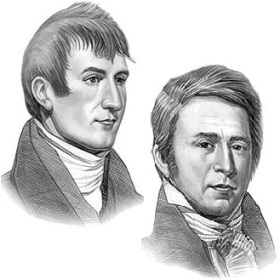|
February 20, 1805
Wednesday, 20th. The
day was delightfully fine; the mercury being at sunrise 2° and
in the course of the day 22° above 0, the wind southerly. Kagohami
came down to see us early: his village is afflicted by the death
of one of their eldest men, who from his account to us must
have seen one hundred and twenty winters. Just as he was dying,
he requested his grandchildren to dress him in his best robe
when he was dead, and then carry him on a hill and seat him
on a stone, with his face down the river towards their old villages,
that he might go straight to his brother who had passed before
him to the ancient village under ground. We have seen a number
of Mandans who have lived to a great age; chiefly however the
men, whose robust exercises fortify the body, while the laborious
occupations of the women shorten their existence.
February
21, 1805
Thursday 21. We had
a continuation of the same pleasant weather. Oheenaw and Shahaka
came down to see us, and mentioned that several of their countrymen
had gone to consult their medicine stone as to the prospects
of the following year. This medicine stone is the great oracle
of the Mandans, and whatever it announces is believed with implicit
confidence. Every spring, and on some occasions during the summer,
a deputation visits the sacred spot, where there is a thick
porous stone twenty-feet in circumference, with a smooth surface.
Having reached the place the ceremony of smoking to it is performed
by the deputies, who alternately take a whiff themselves and
then present the pipe to the stone; after this they retire to
an adjoining wood for the night, during which it may be safely
presumed that all the embassy do not sleep; and in the morning
they read the destinies of the nation in the white marks on
the stone, which those who made them are at no loss to decypher.
The Minnetarees have a stone of a similar kind, which has the
same qualities and the same influence over the nation.
Captain
Lewis returned from his excursion in pursuit of the Indians.
On reaching the place where the Sioux had stolen our horses,
they found only one sled, and several pair of moccasins which
were recognised to be those of the Sioux. The party then followed
the Indian tracks till they reached two old lodges where they
slept, and the next morning pursued the course of the river
till they reached some Indian camps, where captain Clarke passed
the night some time ago, and which the Sioux had now set on
fire, leaving a little corn near the place in order to induce
a belief that they were Ricaras. From this point the Sioux tracks
left the river abruptly and crossed into the plains; but perceiving
that there was no chance of overtaking them, Captain Lewis went
down to the pen where captain Clarke had left some meat, which
he found untouched by the Indians, and then hunted in the low
grounds on the river, till he returned with about three thousand
pounds of meat, some drawn in a sled by fifteen of the men,
and the rest on horseback; having killed thirty-six deer, fourteen
elk, and one wolf.
Next Journal
Entry
|

